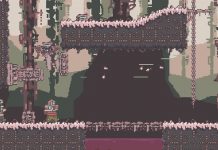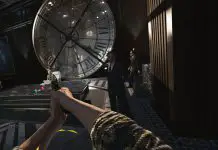I’ve been looking forward to Koira – the debut title from Brussels-based Studio Tolima – ever since I first had an appointment for it at gamescom 2023. About a year and a half later, after rolling credits in roughly four hours, I’m pleased to state that Koira tells a beautiful and touching tale featuring the cat-like player character and a sweet red-nosed dog, the latter of which completely steals the show. This is not to imply that Koira is entirely without blemishes, however, as the story is tried and true, and the light puzzles can occasionally be finicky or obscure.

For those reading who are unfamiliar with this release, Koira is an adventure game set in, presumably, a tundra. The player assumes the role of the traveller, a somewhat lonesome figure who, in the beginning moments of the title, encounters a trapped puppy. From then on, the two forge a bond that is at the core of the project – which is exactly what director and producer Ben Lega himself told me would be the case in an interview conducted in summer 2024.
“Koira tells a beautiful and touching tale featuring the cat-like player character and a sweet red-nosed dog, the latter of which completely steals the show.”
No spoilers here, but the two eventually set out to find shelter and maybe even make a home out of a house. As might be expected, things don’t always go as planned, especially as some shady figures grow increasingly interested in the pair.
To the game’s credit, I was emotional during key story moments, and I couldn’t help but think of my own dog, Rufus, who, very much like the dog the player travels with, is a glowing presence in a world that, every day, is steeped further and further in darkness. From a story point of view, the only disappointment I have with Koira is that it never seeks to say anything new about the important topics it brings to the table. What is here is by no means derivative, but it is something also covered in recent indie titles such as Neva and seen in Studio Ghibli’s Princess Mononoke.

Fortunately, like Neva and Princess Mononoke, Koira is an absolute delight to look at. The visual style, by no coincidence, brings to mind Franco-Belgian comics (or bande dessinée) such as The Adventures of Tintin, although I personally found Koira to be more similar to Marjane Satrapi’s excellent graphic memoir, Persepolis, in this sense. Music-wise, the soundtrack is gorgeous and a treat to the ears. The way Studio Tolima deploys the soundtrack, too, is nothing short of impeccable, as they know exactly when to kick it into gear or show restraint and let the silence do the talking. This is especially important, considering that the characters are silent outside of communicating through musical notes.
“What Koira lacks in gameplay complexity, it more than makes up for in emotional resonance and visual storytelling.”
To an extent, music plays an important role in gameplay as well, since most of the puzzles involve making the right sound(s) or acquiring the correct notes in a specific order. These puzzles are more often than not quite simple and satisfying, but there are a few which can be frustrating as the solutions can be unintuitive and may require finnicking.
Apart from this, Koira often puts players in situations where sneaking around is the only way through. These situations are more hit than miss, but, like with the puzzles, when they’re not immediately obvious, they can be hard to decipher. In any case, gameplay is not necessarily a top priority for Koira: this is a story-focused adventure game, first and foremost.

As such, as a story-focused adventure game, Koira is a great release and one not to be missed by those who favour emotionally charged narratives above all. What’s more, it serves as an amazing debut title from Studio Tolima, who have just achieved their mission objective of “crafting lasting emotional experiences” for the very first time. Hopefully, Koira will serve as a strong foundation for more of their games in the years to come. I, for one, am very much looking forward to that future.


































